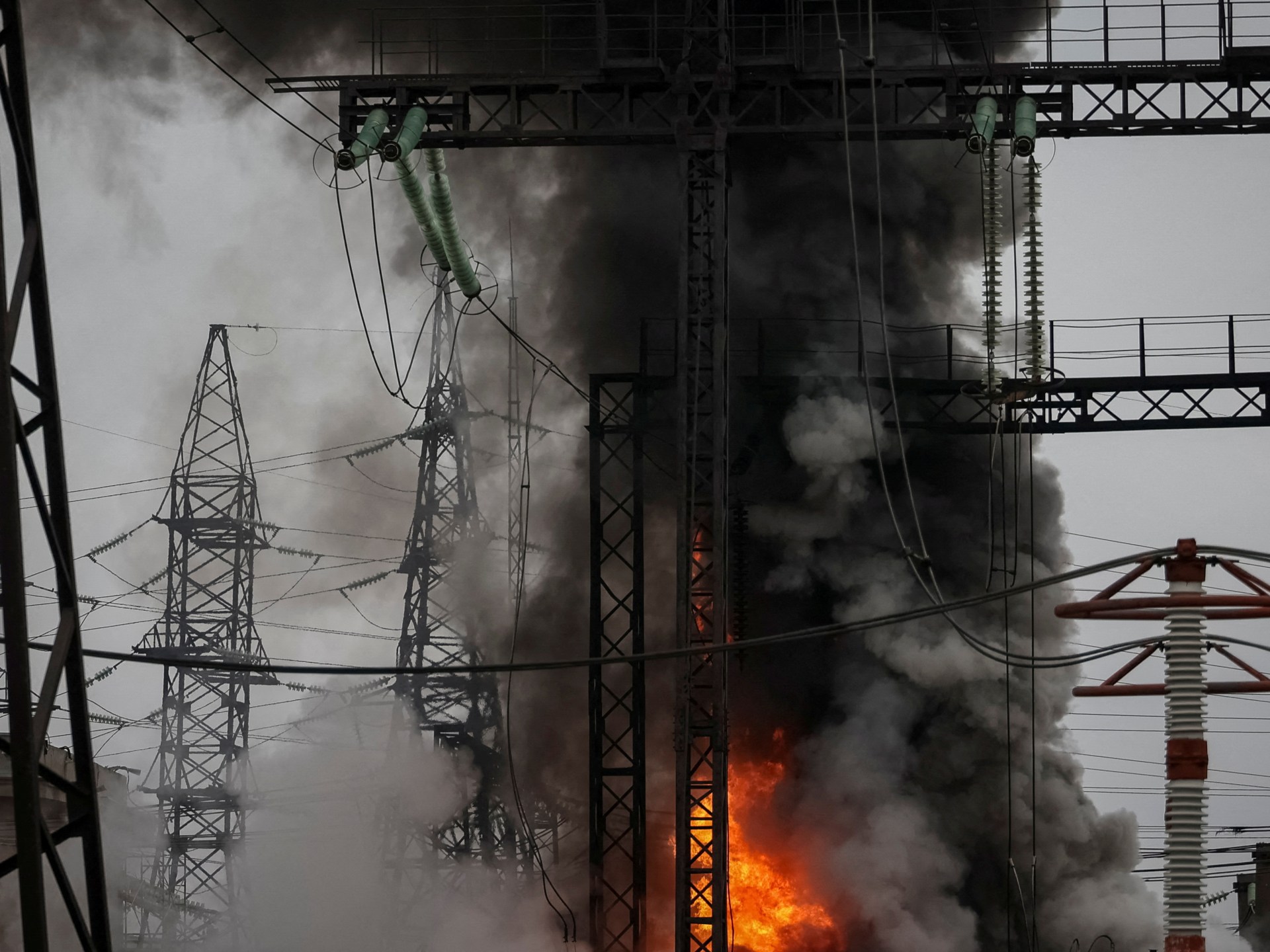
Olena Rozumovska is at the end of her strength.
Their two-bedroom apartment in a Soviet-era concrete building has no electricity or water, and the central heating is out because of Russian drones and missiles beaten Kharkiv, Ukraine’s second largest city, on Friday.
“It is unbearable, impossible. I want to cry in despair,” the 33-year-old, whose husband Mykhailo is fighting against Russian forces in southeastern Ukraine, told Al Jazeera by phone.
Outside temperatures in Kharkiv barely rose above freezing on Friday, there was a cold drizzle and her apartment building was “losing heat,” she said.
Early in the morning she jumped out of bed when she heard the sound of a huge explosion. More than a dozen severe, bone-chilling blows followed as she hid in the cold basement with her two children, Bohdan, seven, and four-year-old Roxana.
The children were “hysterical” about having to leave their Siamese cat behind. Her pet named Monya didn’t come out from under the sofa.
What unnerved them and millions of Ukrainians was the scale of the bombing, which became the largest attack on their country’s energy infrastructure since the war began in 2022.
“The goal is not only to destroy the energy infrastructure, but to try again to cause a massive disruption of the energy infrastructure like last year,” Energy Minister Herman Halushchenko wrote on Facebook.
In the winter of 2022-2023, Moscow moved to massive shelling attacks on energy infrastructure and civilian sites after Moscow realized that its blitzkrieg to conquer all of Ukraine had failed.
Friday’s attacks involving about 60 drones and 90 missiles killed at least two people, injured scores, hit Ukraine’s largest dam and knocked out power to the Russian-occupied Zaporizhzhia nuclear power plant, officials said.
Ukrainian President Volodymyr Zelensky criticized the West for months of delays in military aid.
“Russian missiles, unlike aid packages for Ukraine, have no delays. [Iranian-made] “Shahed” drones, unlike some politicians, have no indecision. It is important to understand the costs of delays and postponed decisions,” he wrote on X, formerly known as Twitter.
Energoatom, Ukraine’s largest nuclear agency, said the Zaporizhzhia power plant was “on the verge of a blackout” as the strike had knocked out the main power line.
Russia seized the power plant in March 2022 but failed to divert its electricity flow to energy-starved Crimea.
The plant’s reactors have been shut down but require constant power to keep them cool and prevent the uranium fuel rods from melting.
Within hours, the severed line was reconnected, a source at Energoatom told Al Jazeera.
“This is the main power line. There is also a reserve and if only that is left, there is a risk of a power outage,” the source said.
Friday’s attack was the second in two days – a change in tactics as Moscow “looks for the most effective ways to achieve its goals,” defense spokeswoman Natalya Humenyuk said.
“We are looking for effective ways to counter them – and they are looking for ways to exert pressure [and] terrorize,” she said in a televised speech.
“It’s hard to remember two seizures on two days in a row. But such an attack was expected after [presidential] “Election in Russia,” which took place March 15-17, she said.
Some analysts disagreed with her assessment.
There is no change in tactics and the Russian attacks are proceeding “as usual,” Nikolay Mitrokhin of the University of Bremen in Germany told Al Jazeera.
They were revenge for a series of successful Ukrainian attacks inside Russia, he said.
In recent weeks, pro-Ukrainian battalions of Russian nationalists have repeatedly attacked the western Russian regions of Belgorod and Kursk on the border with Ukraine.
They were supported by devastating Ukrainian drone and missile attacks on Belgorod.
On Wednesday, new, advanced Ukrainian drones arrived at a key airfield in Russia’s Volga region that was used by strategic bombers to fire missiles into Ukraine.
Moscow said its forces shot down the drones, but Mitrokhin said the attack was “apparently successful.”
In recent months, additional drone and missile attacks have destroyed or damaged Russia’s energy infrastructure.
According to a calculation by the Reuters news agency, Ukraine has attacked at least nine oil refineries in western Russia as well as depots, terminals and storage facilities since January, reducing Moscow’s oil processing capacity by seven percent.
On March 13, one of the attacks set a refinery in the western city of Ryazan on fire, causing two refinery units to close. The massive refinery produces nearly 6 percent of Russia’s refined crude oil.
A day earlier, another Ukrainian strike halved capacity at another refinery near the city of Nizhny Novgorod, more than 1,000 km (621 miles) east of the Ukrainian border.
The attacks dealt a blow to Moscow’s main source of export revenue, which is funding the war in Ukraine, despite the West’s crippling sanctions.
Washington called on Kiev to stop the attacks on the refineries as they could escalate the conflict, according to the Financial Times reported on Friday.
This week’s twin attacks by Moscow troops could also pave the way for Russia’s summer ground offensive.
“This could be viewed as a new operation that will serve as a prelude to Russia’s summer offensive,” Kiev-based analyst Aleksey Kushch told Al Jazeera.
Another observer warned that the most serious and worrying attack on Friday was the attack on the dam of the two Dniprovska hydroelectric power plants, the largest in Ukraine.
“Sooner or later, attacks like this were bound to happen,” Kiev-based analyst Ihar Tyshkevich told Al Jazeera.
He said melting snow and ice in the upper reaches of the Dnipro River had already triggered a spring flood that would peak within a month.
“Imagine if just one dam was affected,” he said.
Russian missiles hit the power plant in December 2022 and February 2023. Friday’s attack damaged both power plants and caused a major fire.
“However, there is no risk that the dam will be destroyed,” Ihor Sirota, head of the Ukrhydroenergo agency that operates the stations, told Radio Liberty.






Recent Comments